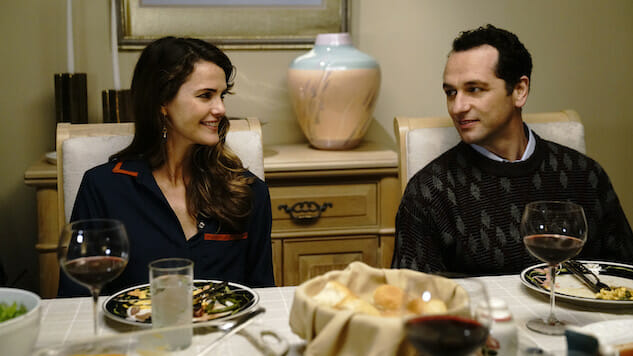The Americans: The Beginning of the End
(Episode 6.01)
Photo: Patrick Harbron/FX
Long before her fatigue gets the best of her, Elizabeth Jennings (Keri Russell) has the appearance of a woman bearing the weight of the world. And perhaps she is: With nine weeks remaining until negotiations on the Strategic Arms Reduction Treaty (START) between the United States and the Soviet Union begin in earnest, she spends her day racing from mark to mark, desperate to protect her country’s interests. No wonder that Elizabeth, almost sick from fretting—she goes through more cigarettes in tonight’s high-strung hour than in entire seasons past—seems to see herself, and to be seen, in the art of her charge, Erica (Miriam Shor), the bedridden wife of a START negotiator. Elizabeth is the enigmatic figure, the angular form, the opaque presence, which Erica has already sussed out. “Art’s not my thing,” Elizabeth says, unable to offer much of an opinion on one of the painter’s troubling canvases. “That’s like saying life’s not your thing,” Erica scoffs. “Beauty’s not your thing.”
In its sixth and final season, then, FX’s espionage drama remains one of the medium’s most quietly stylish series, a model of precision and patience in an age obsessed with speed: When Philip (Matthew Rhys) finally confronts Elizabeth in the closing moments of “Dead Hand” — “Your whole way of being seems off,” he says — their disagreement vibrates with the same unnerving energies that writers Joe Weisberg and Joel Fields and director Chris Long build into the opening sequence. That montage—lest you’d forgotten that The Americans has mastered the technique—sets the table for the episode, the season, in crisp, caustic strokes. There’s Philip in his natty suit, overseeing the travel agency’s expansion; there’s Elizabeth in a Washington, D.C., hotel room, staring mournfully at the spot-lit Mall after bedding a target; there’s Philip smiling through his car’s open sunroof; there’s Elizabeth in a long coat and baseball cap, waiting on something, anything, to point the way forward. Most telling, though, is the contrast between Elizabeth’s home health aide disguise—bright pastels and auburn hair, the picture of misplaced optimism—and Erica’s charcoal sketch—faceless and colorless, rather skeletal, as dead as Elizabeth’s exhausted expression.
As it happens, the beginning of the end for The Americans is reminiscent of the end of the beginning, in which the spies’ most dangerous game is any game they play apart. After being shot in the stomach in the Season One finale, Elizabeth asks Philip to “come home,” which “Dead Hand” recalls—and twists—by destabilizing the term’s meaning. Is “home” still Moscow, so unrecognizable to Elizabeth in the Russian comedy she screens with Claudia (Margo Martindale) and Paige (Holly Taylor)? Is “home” still the place behind the red door, now that Paige is in college and Henry’s at prep school? Is it possible to find “home” at work, when that work is the sleepless labor of the secret agent? To “come home,” in The Americans—now set in 1987, six years after the series premiere—is no longer assured, if it’s even still possible, because “home” changes as surely as we do; it becomes an off-campus apartment or a boarding-school dorm room or an American travel agency by degrees, almost imperceptibly, until one day we discover we no longer know where—or who—we are.
-

-

-

-

-

-

-

-

-

-

-

-

-

-

-

-

-

-

-

-

-

-

-

-

-

-

-

-

-

-

-

-

-

-

-

-

-

-

-

-








































